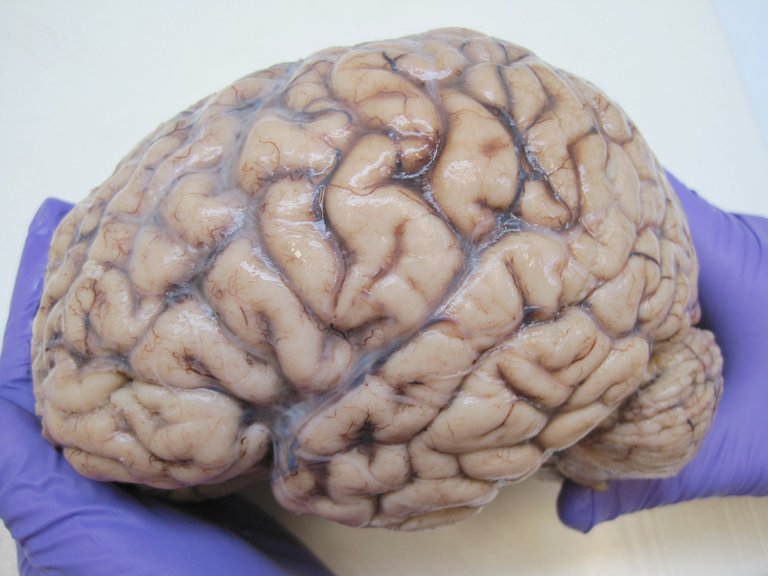Unraveling the Mysteries of the Size, Functionality, and the Everlasting Enigma of the Brain
From ants to bees, in our previous posts, we delved into the fascinating world of these social insects, exploring their interactions, community dynamics, and communication. Today, let's shift our focus to the enigmatic realm of the brain and explore a few intriguing aspects of this remarkable organ.
One pressing question we'll address is, 'Does having a larger brain make an organism smarter?' Well, the answer is far from simple, much like navigating the complexities of a relationship. Brain size, in itself, doesn't necessarily correlate with intelligence. While the human brain surpasses that of many primates in size, evolving to be much larger than our ancestors, such as the homo habilis, the relationship between brain size and intelligence remains elusive. Extensive research has attempted to establish a connection, including a Meta-Analysis study that analyzed results from 88 studies and over 8,000 brains, ultimately concluding that brain size accounts for less than 6% of IQ variation in individuals.
The intricate relationship between brain size and functionality continues to be a topic of intense research. One hypothesis examines the role of neuronal interconnectivity in intelligence, suggesting that fewer connections between neurons may result in enhanced cognitive abilities. Furthermore, the association between brain size, white matter connectivity, and intelligence is still a subject of ongoing debate. In a 2017 study involving brain examinations of 259 participants, scientists discovered a weak correlation between the number of dendrites and test scores, indicating that the number of neurons alone does not determine intelligence; it is the efficiency of these neurons that matters.
Speaking of brain functionality, you may have come across the concept of 'left-brain' and 'right-brain' individuals while browsing the internet or encountering self-proclaimed psychiatrists peddling products. It's important to note that the brain consists of two hemispheres, the left and the right, which work together simultaneously—a phenomenon known as brain lateralization. Although the hemispheres possess distinct characteristics, such as the left hemisphere having more miniature columns of neurons and increased myelination, the notion of people being purely 'left-brained' or 'right-brained' is overly simplistic. Language processing primarily occurs in the left hemisphere, while visual recognition is associated with the right hemisphere. Therefore, both hemispheres play crucial roles in human cognition.
Continuing our exploration of the brain, it's clear that there is still much we don't fully comprehend about our bodies and their intricate systems. Would you believe that the existence of the glymphatic system—a waste removal mechanism in the brain—was only recently discovered? This vital system operates while we sleep, preventing the development of certain diseases. While cells in the body continually function, the lymphatic system assists in clearing the waste they produce. Prior to the discovery of the glymphatic system, scientists believed that brain waste diffused into the cerebrospinal fluid, then to the spinal cord and circulatory system. However, in 1971, Helen CSERR demonstrated that some waste couldn't diffuse easily, leaving the precise pathway uncertain until researchers at the University of Rochester utilized two-photon microscopy in 2012 to examine mouse brains and observe the glymphatic system responsible for brain waste removal. Unlike the lymphatic system, the glymphatic system lacks vessels and instead allows fluid to flow between the surrounding blood vessels. Additionally, in 2017, scientists discovered lymphatic vessels in the brain's meninges.
Despite our seemingly vast knowledge about the brain, it's astonishing to realize that scientists continue to unearth new systems, pathways, and organs within this complex organ. Furthermore, as previously mentioned, having a larger brain does not automatically equate to greater intelligence. Scientist are still not clear on this completely, so like I said in the beginning, our brain is complicated.
Reference
- (https://australian.museum/learn/science/human-evolution/larger-brains/)
- (https://www.ncbi.nlm.nih.gov/pmc/articles/PMC7440690/)
- (https://neuroscience.stanford.edu/news/ask-neuroscientist-does-bigger-brain-make-you-smarter)
- (https://www.nature.com/articles/s41467-020-19378-5)
- (https://www.sciencedirect.com/science/article/abs/pii/S014976341500250X)
- (https://www.ncbi.nlm.nih.gov/pmc/articles/PMC4432881/)
- (https://www.ncbi.nlm.nih.gov/pmc/articles/PMC4227509/)
- (https://www.ncbi.nlm.nih.gov/pmc/articles/PMC5954098/)
- (https://nerdfighteria.info/v/dp1oPvX5T1M/)
- (https://www.ncbi.nlm.nih.gov/pmc/articles/PMC8300231/)
- (https://www.ncbi.nlm.nih.gov/pmc/articles/PMC4232939/)
- (https://www.ncbi.nlm.nih.gov/pmc/articles/PMC4636982/)
- (https://www.ncbi.nlm.nih.gov/pmc/articles/PMC7176397/)

Yay! 🤗
Your content has been boosted with Ecency Points, by @merrymercy.
Use Ecency daily to boost your growth on platform!
Support Ecency
Vote for new Proposal
Delegate HP and earn more
Thanks for your contribution to the STEMsocial community. Feel free to join us on discord to get to know the rest of us!
Please consider delegating to the @stemsocial account (85% of the curation rewards are returned).
Thanks for including @stemsocial as a beneficiary, which gives you stronger support.
I study the secrets of the hidden anatomy of the human being and it is very interesting what there is to discover.
Actually, our brain is its own universe with all the necessary connections to control our body.
There are elitist people who have been trying to keep the brain alive outside the human organism since the 60-70s. I think they want to do this because they are afraid of eternal judgement, because they have so much crap in their heads and their mind is not the mind of God.
Nice post. !PIZZA
$PIZZA slices delivered:
@themyscira(2/5) tipped @merrymercy